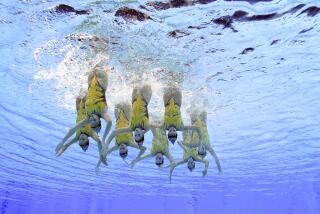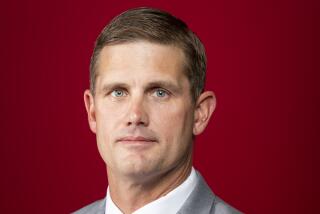U.S. Swim Team Faces Drug Probe
- Share via
ATHENS — The International Olympic Committee is expected to launch an inquiry after the Olympics, looking into a report that two female American swimmers used a banned human growth hormone shortly before the 2000 Games in Sydney.
This is despite the fact nutritionist Glen Luepnitz, who was quoted in the initial story last week in the Australian newspaper the Advertiser, has denied telling the publication that the women had used the performance-enhancing drug, MediTrophin.
Thomas Bach of Germany, an IOC vice president and member of the inquiry commission charged with looking into the case, indicated Wednesday that a review was unlikely during the Olympics.
“We heard this may be a translation mistake,” he said, adding, “We will clarify after the Games.”
What would normally be dismissed as a possible misunderstanding has taken on added scrutiny under the current BALCO-charged climate in sports. The only swimmer to appear before the grand jury in the long-running BALCO investigation has been Amy Van Dyken, who won four gold medals in 1996. She has not commented on her testimony and has not been charged.
So, just days away from the start of the Olympics, American coaches were answering questions on the pool deck about doping. Most of the focus found U.S. assistant Richard Quick, who is also the coach at Stanford.
In 2000, Quick, then the head women’s coach, spoke of what Luepnitz was able to do with his extensive supplement program for the likes of his Stanford swimmers, among others, Jenny Thompson, Dara Torres and Misty Hyman.
Here in Athens, Quick, who had spoken earlier in the day, declined to take questions during an evening practice session at the Olympic Aquatic Center. But he issued a short statement through a USA Swimming spokesperson.
“I don’t want this to continue through this meet,” Quick said. “If there’s going to be an investigation, I will gladly answer any question that the IOC, WADA or USADA has. Glen was not on our staff in 2000, but he was a nutritional advisor to me and some of my athletes.
“Not one of our athletes took any performance-enhancing drugs, and they have never failed any drug tests.”
The Australian report called Luepnitz a “senior medical advisor” to the U.S. swim team in 2000. USA Swimming executive director Chuck Wielgus disputed that characterization as well.
“USA Swimming is aware of the rumors involving Glen Luepnitz, who was not a member of the U.S. staff but did have some involvement with individual members of the 2000 U.S. Olympic swim team,” Wielgus said in a statement. “USA Swimming has absolutely no knowledge of any inappropriate activity involving performance-enhancing drugs among our swimming athletes at the Sydney Games.”
More to Read
Go beyond the scoreboard
Get the latest on L.A.'s teams in the daily Sports Report newsletter.
You may occasionally receive promotional content from the Los Angeles Times.







